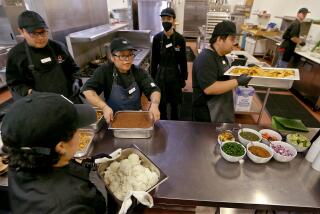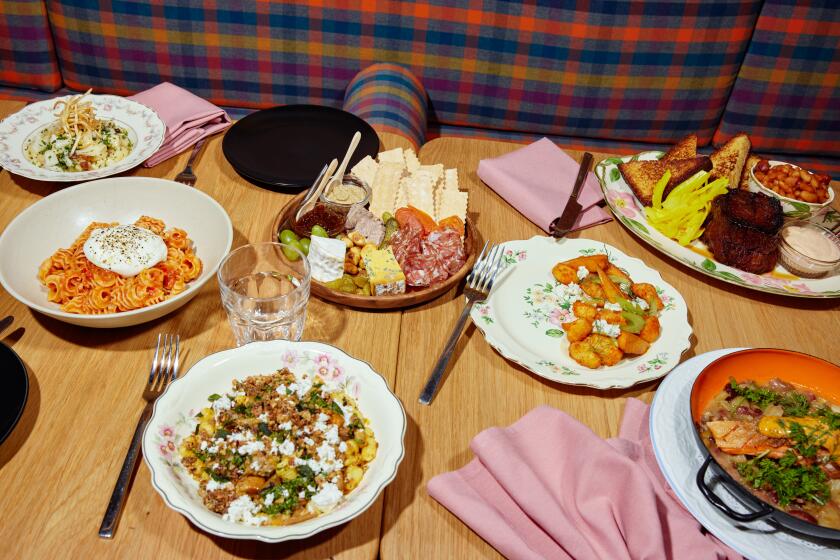Out of the Coal Mine and Into the Kitchen : Cooking: A slowdown in mining prompted career changes for 25 would-be chefs.
- Share via
PUNXSUTAWNEY, Pa. — Five of the 25 aspiring chefs in the Culinary Arts School’s freshman class came to the kitchen the hard way: Via the coal mine.
After years in underground caverns, the five are trading their picks and shovels for whisks and spoons, their helmets for toques. This is not necessarily their choice; the mines are closing, and they need jobs.
But they are embracing their new careers.
“If I had never gotten laid off, that would have been sad. I would have never heard about the school,” said Mary Yaworski as she completed her first semester. “I never want to go back to coal mining. Never.”
Yaworski spent 11 1/2 of her 43 years underground, supporting her four kids. Then, last fall, nearly half the 1,000 employees in the BethEnergy No. 33 mine in Cambria were laid off; she was one of them.
“I thought, ‘OK, Mary, you’ve done what you had to do to raise your family,’ ” she said. “ ‘Now what do you want to do?’ ”
The answer for Yaworski and three of her co-workers was the Culinary Arts School, established in 1989 by the Indiana University of Pennsylvania. The two-year program trains cooks certified by the American Culinary Federation.
A retraining program administered jointly by the United Mine Workers and the coal industry under their 1988 contract will pay the two-year tuition of $17,000.
“Before I came here, I thought I could cook, but it’s entirely different,” Yaworski said. “It’s classical cooking. In some classes, there was so much French I thought I was going to have to quit.” Kevin Duffy, the acting director of the school, has a cosmopolitan background: chef for Intercontinental Hotels in Europe, Africa and Asia.
“When they first arrive, we treat them all as if they don’t know how to boil water,” said Duffy. First-semester course work includes an introduction to hot foods, cold foods, baking and soups, stocks and sauces. Students are expected to be able to identify meat after the first semester and seafood after the second.
In the second year of the two-year program, students branch out into regional cuisine, wine and advanced table service.
“Advanced Culinary Skills” in the final semester includes spice usage, timesaving devices and “intensive review of vegetable cuts.” “Supervisory Management” teaches how to run a kitchen.
“There’s no room for loners,” Duffy said. “We’re getting them ready for teamwork.”
The coal miners who have entered the school brought teamwork experience with them--no one mines coal alone. But the miners say there are other parallels between working in a mine and working in a kitchen.
“Cooking is not an easy profession,” said Larry P. Mondi, who still works underground when he’s not at school. “It’s time-consuming and can be laborious. There can be similar skills. You need to be a good worker. You can’t be a loafer. Otherwise, people aren’t going to hire you.”
Mondi, a miner for 18 years, lays cinder blocks for ventilation passages in the Greenwich Collieries South Mine near Ebensburg. The company plans to close the 525-person operation next March, he said.
“The union won’t pay the tuition because I haven’t been laid off yet, but I decided I wanted to try to get a jump on it,” said Mondi.
Each weekday, he gets the dirtiest and cleanest he can be. The soot from the coal mine contrasts sharply with the white jacket, chef’s hat and tie he must wear to class every day.
Mondi figures he will do various jobs in a kitchen.
“I like the variety that it’s going to offer me,” he said. “I’m not going to just stand in line all day long and make the same things.
“I couldn’t stay in one field in the mine, either.”
More to Read
Eat your way across L.A.
Get our weekly Tasting Notes newsletter for reviews, news and more.
You may occasionally receive promotional content from the Los Angeles Times.









